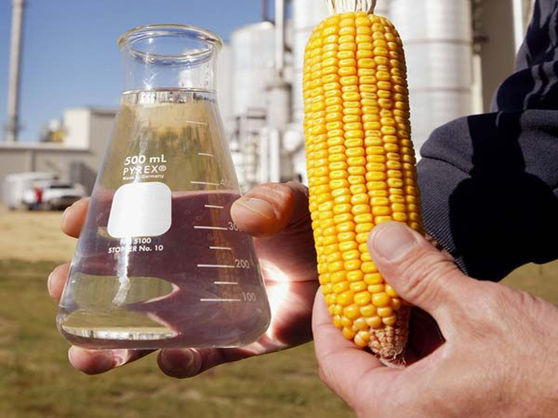
Agricultural News
Study Supports Need To Reform Ethanol Production Mandate, Livestock and Poultry Groups Say
Thu, 19 Jul 2012 10:10:25 CDT

In response to a new economic study on the impact of corn ethanol production on food prices and commodity price volatility, a coalition of livestock and poultry groups is urging Congress to reform the federal Renewable Fuels Standard (RFS), which mandates the amount of ethanol that must be produced annually.
Conducted by Thomas Elam, Ph.D., president of FarmEcon LLC, an Indiana agricultural and food industry consulting firm, the study found that federal ethanol policy has increased and destabilized corn, soybean and wheat prices to the detriment of food and fuel producers and consumers.
The RFS, first imposed in 2005 and revised in 2007, this year requires 15.2 billion gallons of ethanol to be produced. Most of that amount is blended into gasoline at 10 percent.
"The increases we've seen in commodity prices are strongly associated with the RFS mandate," said Elam. "At the same time, we haven't seen the promised benefits on oil imports or gasoline prices. This means that while Americans are forced to pay more for food, they're also not seeing lower prices at the pump; it's a lose-lose situation."
As a Senate Biofuels Investment and Renewable Fuels Standard Market Congressional Study Group examines several aspects of the RFS, the study will provide critical facts needed to reform the current standard. Among other results, the study found that because of the RFS:
· Ethanol, because its energy cost is higher than gasoline and because of its negative effect on fuel mileage, added about $14.5 billion, or 10 cents a gallon, to motorists' fuel costs in 2011.
· Increased ethanol production since 2007 has had no effect on gasoline production or oil imports, contrary to supporters' claims.
· Corn used for ethanol production rose 300 percent from 2005 to 2011, increasing from 1.6 billion bushels to 5 billion. (Ethanol production now uses more than 40 percent of the U.S. annual corn supply.)
· Corn now represents about 80 percent of the cost of producing ethanol compared with 40-50 percent before implementation of the mandate.
· Corn prices jumped to more than $6 a bushel in 2011 from $2 in 2005.
· The rate of change for the Consumer Price Index for meats, poultry, fish and eggs increased by 79 percent while it decreased by 41 percent for non-food items since the RFS was revised in 2007.
· Ethanol production costs and ethanol prices have all but eliminated a market for ethanol blends higher than 10 percent.
· The United States exported 1.2 billion gallons of ethanol in 2011.
In addition to the effects of the RFS, the study pointed out that on an energy basis, ethanol, which has only 67 percent of the net energy per gallon of gasoline, never has been priced competitively with gasoline. It also found that, contrary to supporters of the RFS, oil imports have declined not because of increased ethanol production but because of increased domestic crude oil production and higher refinery yields. In urging reform of the RFS, the coalition cited the Elam study's conclusion that the mandate should be revised to allow automatic adjustments to reduce incentives for ethanol production when corn stocks are forecast to reach critically low levels.
The coalition supports legislation - the "Renewable Fuels Standard Flexibility Act" (H.R. 3097), sponsored by Reps. Bob Goodlatte, R-Va., and Jim Costa, D-Calif. - that would require a biannual review of ending corn stocks relative to their total use. If the ratio falls below 10 percent, the RFS could be reduced by 10 percent. If it falls below 7.5 percent, the mandate could shrink by 15 percent; below 6 percent, it could be reduced by 25 percent; and if the ratio falls below 5 percent, the ethanol mandate could be cut by 50 percent.
Such relief is extremely urgent, the coalition points out, because the recent spike in corn prices prompted by drought conditions in much of the Corn Belt has analysts predicting the United States will run short of corn this summer. Another short corn crop would be extremely devastating to the animal agriculture industry, food makers and foodservice providers, as well as consumers, says the coalition.
Because of the RFS, however, corn-based ethanol manufacturers are protected from sharing the full burden of a corn harvest shortfall.
The Elam study was funded by the American Meat Institute, California Dairy Inc., the Milk Producers Cooperative, the National Cattlemen's Beef Association, the National Chicken Council, the National Pork Producers Council and the National Turkey Federation.
A full copy of the study is available by clicking here.
WebReadyTM Powered by WireReady® NSI
Top Agricultural News
More Headlines...




















